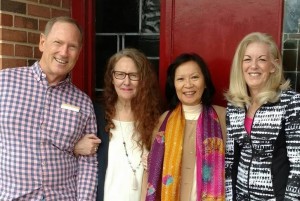 Realize that I love your smile, your teeth, the hair upon your head, the warm, smooth shape of your skull. Realize that I love your hands and that as you take another’s hand, you hold my own, and that I am with you as well as within you. Realize that I love all that you are, and that as you snarl in anger, cry in despair, hang your head in weariness, howl with laughter, I am with you and within you. . . . You will realize as you enter union by means of the bridge of our direct relationship that you will not leave your humanity behind. D:Day39:43-44
Realize that I love your smile, your teeth, the hair upon your head, the warm, smooth shape of your skull. Realize that I love your hands and that as you take another’s hand, you hold my own, and that I am with you as well as within you. Realize that I love all that you are, and that as you snarl in anger, cry in despair, hang your head in weariness, howl with laughter, I am with you and within you. . . . You will realize as you enter union by means of the bridge of our direct relationship that you will not leave your humanity behind. D:Day39:43-44
It seems impossible that a week has passed since the ACOL Gathering in St. Louis. What a wonder that was. Like going into the new, and returning new. Going to a new place as a new self, and returning home as a new self. The people I met were the shining stars of the experience. They graced me with their presence and an uncommon eloquence about their experience of A Course of Love.
I failed to find eloquence in at least one place, and a place so dear to my heart that I feel a bit embarrassed by it.
I was asked about the Way of Mary and I turned to the book. The book! I could not recall what Jesus says about the Way of Mary. To be honest, I thought what he said was confusing. Yet I’ve always “known it” as something that you . . . just know. You don’t know it till you know it and then it’s like you’ve always known it. That’s how I felt it about it—until last weekend when I drew a blank! What can account for such things? Today it felt like something bursting to come clear in me, and led me to a rather bizarre thought:
Lose yourself to find yourself could almost be rephrased into “find yourself to lose yourself.”
As I reflected on it this morning, it seems there are as many ways we are asked to find our Selves as to lose ourselves. Maybe this could be a sort of reverse order to ACOL. In other teachings, perhaps it’s more about losing than finding. I’m not sure, as this is a new idea. But there’s not much if any loss. We hear a lot – “there is no loss but only gain.” But what I’m thinking of us is how we continue to be who we are. This is where the major challenges of this new way arise, actually. You don’t lose “you”…you keep “yourself” and you change at the same time. And it shows the truth of this passage:
it shows the truth of this passage:
In developing the confidence of the self of form, we work with what has been in a new way, and as you all know from the time of learning, it is often more difficult to become adept in doing something in a way different than you have done it before than to do something completely new. D:Day 10.12
Day 10 of the Dialogues addresses this most clearly, and I’m going to share a passage from it. This is the day in which Jesus asks us to quit hearing his voice as the man Jesus, in order that we may expand our confidence in our own elevated Self of form:
Part of the difficulty you find in accepting reliance on your Self is what you have “learned” within this Course. As you “learned” to remove the ego and deny the personal self, you transferred your reliance to me and to the state of unity. This was purposeful. Now, however, you are asked to return to wholeness, a state in which you are not separate from me or from the state of union. You have “learned” the distinction between Christ-consciousness and the man Jesus. You have “learned” the distinction between your Self and the man or woman you are. Now you are called to forget what you have “learned” and to let all distinctions slip away. You are called to forget what you have learned and to realize what you know. D:Day10:17-18
To continue to identify this voice with that man is to be unable to recognize this voice as the voice of your own true consciousness—the voice of Christ-consciousness. Yet to realize that this is the same voice that animated the man Jesus two thousand years ago will aide you in realizing that this is the voice that will now animate the elevated Self of form, or in other words, you. I have spoken with you throughout this time as the man Jesus so that you realize that man and Christ-consciousness can be joined. That you, as man or woman, existing in this particular time and space, can join with Christ-consciousness. You can be both/and, rather than either/or. D:Day10.20-21
Leading back to the way of Mary:
The way of Jesus represented full-scale interaction with the world, demonstrating the myth of duality, the death of form, the resurrection of spirit. The way of Mary represented incarnation through relationship, demonstrating the truth of union, the birth of form, and the ascension of the body. D:Day17.10
 We have entered Holy Week. Even the non-religious follow this season and this recorded history. Jesus’ death and resurrection could be seen as a classic “lose yourself to find yourself story,” a classic example of the Way of Jesus as described in ACOL: Jesus as example life. What of the Way of Mary? We are told the time of Jesus and the time of Mary might be thought of as two intertwined circles. . . both going on right now. In these two ways it feels like we have the two sides of the “losing/finding ourselves” equation.
We have entered Holy Week. Even the non-religious follow this season and this recorded history. Jesus’ death and resurrection could be seen as a classic “lose yourself to find yourself story,” a classic example of the Way of Jesus as described in ACOL: Jesus as example life. What of the Way of Mary? We are told the time of Jesus and the time of Mary might be thought of as two intertwined circles. . . both going on right now. In these two ways it feels like we have the two sides of the “losing/finding ourselves” equation.
We are to be both/and: true to our Self as created in form, and true to our Self of union. I like this way, even while I fumble once in a while. I like it because I so love experiencing the beauty and diversity of people finding their both/and way.
The next meeting place will be at the ACIM Conference in Las Vegas. Amidst all the often chaotic feeling energy that comes with large gatherings, I trust that we will also feel the energy of unity. I look forward to it all, especially the one-on-one interactions and dialogues that reveal our humanity and our divinity as one. http://acourseoflove.com/mari-perron-in-las-vegas/


Hi Mari, love this blog! Love your ‘block’ as you got to the way of Mary. That is so you, the Mary/incarnational way! Speaking of Incarnation (I do love that word and the idea behind it) Br. Richard Rohr wrote recently in his morning meditations, that the Christian Church took a wrong turn way back into focusing on our sinfulness and need for redemption hence Jesus had to die on the cross for our sins. That whole message made me angry with a God who demanded such horrible sacrifices from his son and from us.
The real message is the Incarnation (Rohr). Jesus came to demonstrate God incarnating in flesh, honoring flesh, having flesh carry divinity so love could know itself in a fuller way through form. To hear this message from the Catholic Church blessed me to my toes!
Then the part about losing ourselves to find ourselves and all that. I am into the Treatises and they make such a big point about ‘unlearning.’ It’s like I have to unlearn so much (like the example I just used of Jesus having to redeem us from our sins). All that we mistakenly were taught and learned and felt as a result, needs to be “lost” or ‘unlearned’ so what we truly know can be remembered. So that is only gain isn’t it! No loss, just liberation from chains of illusion.
Believe it or not, I’m going to a Christian Church to celebrate Easter— the first time in maybe 35 years. Some friends needed a ride and I decided to stay with them. They promised there was a park nearby where I could go if it got to be too much, however I do feel so healed that I will benefit from this celebration.
Happy Easter to you and yours, dear Mari, Paula
PS I don’t know if the above really comments on what you wrote or not, it’s just what came out. 🙂
Paula, As always, what “just came out” is so profound and perfect. I love everything you said and Richard Rohr too. Do let me know how your experience of being back in church goes!
Mari, I’ve always thought that you live the Way of Mary. And that the Way of Mary is something known by experience rather than by understanding. Thus, perhaps, your confusion in St Louis: it’s very difficult to describe oneself in words, especially if who you are is a way of being. (I just read that Day again and it’s clearer than ever 🙂 So to use your own phrase – Burst On!
Ken, What an utterly kind reply. Thank you for seeing the way of Mary in me!